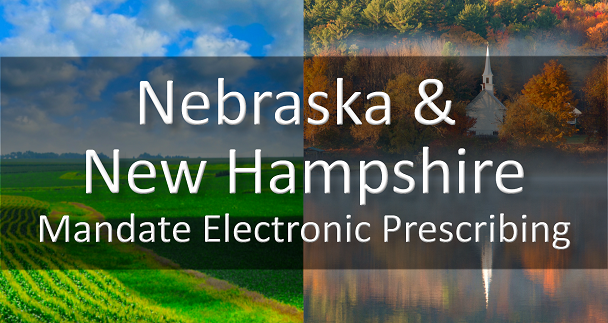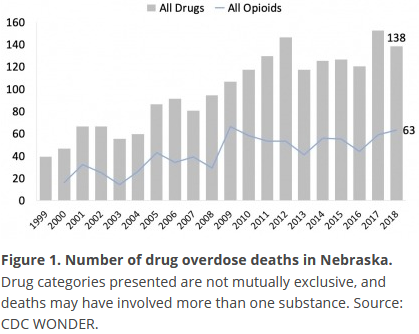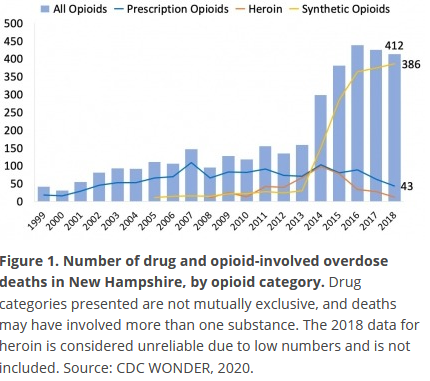
Nebraska Governor Pete Ricketts and New Hampshire Governor Chris Sununu have both recently signed their State’s electronic prescribing mandates into law. Nebraska Legislature Bill 583 mandates healthcare providers to electronically prescribe all controlled substance medications with an effective date of January 1st, 2022. New Hampshire House Bill 143 also mandates providers to electronically prescribe all controlled substances with an effective date of January 1st, 2022.
The Nebraska mandate allows for exceptions to the law including situations that involve State emergencies and patients that reside in long-term care facilities for instance. The Act also states that dentists will also need to comply with the mandate but not until January 1st, 2024. Currently, there are no penalties for non-compliance listed in Nebraska. The Act states that violations shall not be grounds for disciplinary actions. The bill goes into extensive detail regarding pharmacy and dispenser requirements including allowing partial filling of certain schedules of medications.
The New Hampshire mandate is somewhat standard in comparison to legislation that other States have enacted. The mandate contains the usual exemptions such as technological failure, circumstances where the provider dispenses the medication in-office, and for compounded medications. The mandate also establishes a one-year waiver system for providers but does not contain specific details. HB143 also changes regulations regarding licensing requirements for Social Workers and Mental Healthcare providers.
Nebraska Figures and Statistics

Nebraska is very limiting in the data they provide for State overdose statistics. It appears they are currently below the national average for opioid-related overdose deaths, with roughly 7 deaths per 100,000 people when comparing the population of the State in 2018 to the number of overdoses provided. The national average is 14.6 deaths. Prescription opioid overdose deaths continued to gradually rise until 2013, then remained stable until another spike in 2017. Rates of deaths involving opioids appears to have been similar since 2009.[1] Nebraska passed legislation in 2018 attempting to tackle their opioid dependence issues. LB931 established guidelines for prescribing both opioids, limiting prescription durations for minors and requiring patient education. LB731 requires prescribers to complete continuing education regarding prescribing opioids. Nebraska does not currently require prescribers to consult the State PMP database.
Nebraska currently has a 67% prescriber enablement for electronic prescribing of controlled substances, right at the national average of 67.1%. Pharmacy enablement in Nebraska for EPCS is 98.0%, above the national average of 96.1%.[2]
New Hampshire Figures and Statistics

New Hampshire currently has the third worst opioid-overdose rate in the country with 33.1 deaths per 100,000 people. Again, the national average is just 14.6 deaths per 100,000 people. Prescription opioid overdose deaths gradually rose until 2014, then began a gradual decline until returning to rates not seen since 2001. Synthetic opioid use however, skyrocketed at the end of 2013.[3] The New Hampshire Controlled Drug Act became effective in 2009 and set a limit on Schedule II and Schedule III controlled substances that can be prescribed. HB1423 was passed in 2016 and required State medical boards to submit guidelines for prescribing controlled substances. In 2015, New Hampshire launched the “Anyone, Anytime” campaign which greatly increased public access for Naloxone.[4] New Hampshire currently requires prescribers to consult the State PMP database.
New Hampshire currently has a 61.8% prescriber enablement for electronic prescribing of controlled substances, below the national average of 67.1%. Pharmacy enablement in New Hampshire for EPCS is 98.8%, above the national average of 96.1%.[2] MDToolbox encourages providers not to wait until the last minute to setup electronic prescribing!
Please see our website for other states that have either passed or have pending legislation that mandates electronic prescribing. MDToolbox looks forward to providing tools and resources to assist providers throughout Nebraska and New Hampshire to ease the transition and help our customers combat the opioid epidemic. With MDToolbox, providers have access to tools such as Electronic Prescribing of Controlled Substances (EPCS) and convenient on the go e-prescribing with our mobile app! We offer a free 30 day free trial, so Contact us for more information!
[1]https://www.drugabuse.gov/drug-topics/opioids/opioid-summaries-by-state/nebraska-opioid-involved-deaths-related-harms
[2]https://surescripts.com/enhance-prescribing/e-prescribing/e-prescribing-for-controlled-substances/
[3]https://www.drugabuse.gov/drug-topics/opioids/opioid-summaries-by-state/new-hampshire-opioid-involved-deaths-related-harms
[4]https://oig.hhs.gov/oas/reports/region1/11801501_Factsheet.pdf